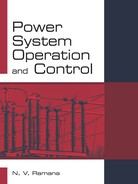3.1 INTRODUCTION
Chapters 1 and 2 are confined to the allocation of system load amongst thermal generating units. However, a power system may consist of thermal as well as hydel generating units. The objective of the power system engineer should rather be stated as the allocation of load optimally between hydel and thermal units to obtain minimum fuel cost. The cost of generation can be influenced to a great extent by considering hydel plants as the water does not cost much and is some times available free of cost. The economic scheduling problem involving both hydro and thermal generating units is very complex as compared to units involving thermal units only. Scheduling amongst thermal units need not consider social obligations except those concerned with pollution. However, in the case of hydro electric plants, social obligations like water requirement for agriculture and other purposes, tributary agreements etc. influence storage limitations, thereby affects power generation. Further more, the availability of water varies from one season to another, making the problem more complex.
Depending upon the optimization period or interval, the study can be unfolded into two case studies as:
- Long range hydro thermal scheduling
- Short range hydro thermal scheduling
3.1.1 Long Range Hydro Thermal Scheduling
In the long range hydro scheduling problem, the optimization interval runs from a week to a maximum of one year. Water inflow into the reservoir is seasonal, and the total volume of water available in a given time interval can be obtained from statistical analysis. This scheduling problem should consider water requirements for agricultural and irrigation. The objective is to determine the quantity of water that can be from the reservoirs for hydel generation over the entire optimization interval such that in coordination with thermal generation the overall cost of generation is minimised. As the concerned period runs for a year, majority of parameters are unknowns such as system load, water inflows, units availability etc.
3.1.2 Short Range Hydro Thermal Scheduling
In this, the optimization interval may run from a day to a week. In this problem, having known the load, available volume of water for hydel generation and the unit availabilities, the objective is to develop a composite incremental production cost objective function. The objective function includes the incremental fuel cost of the thermal plant, the equivalent incremental cost of water and other related constraints. The required water discharge at the hydel plant for optimal hydel generation is conveniently converted into equivalent incremental cost of water. Once the composite objective function is obtained, the treatment of the objective function is the same as that involving only thermal units.
